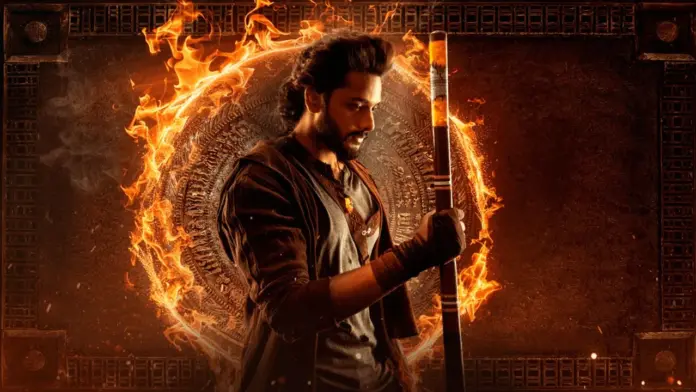Mirai Review: Mythology Meets Modern Cinema in a Grand Fantasy
Karthik Gattamneni’s Mirai brings together mythological imagination and contemporary spectacle in an ambitious fantasy adventure mounted on a grand scale.
In a mythic-futuristic setting, the story follows Vedha (Teja Sajja), an unsuspecting youth who discovers his lineage as part of an ancient warrior clan sworn to protect nine sacred scriptures from the reign of Emperor Ashoka. These relics, if seized, could grant unimaginable power — a threat embodied by the dark sorcerer Mahabhir Lama (Manoj Manchu) and his Black Sword army. Drawn into this struggle, Vedha finds support from Vibha (Rithika Nayak), Angamabali (Jagapathi Babu), Ambica (Shriya Saran), and Agastya (Jayaram Subramaniam), while the mysterious presence of Rana Daggubati hints at conflicts yet to unfold.
Teja Sajja anchors the film with a performance that grows more convincing as his character embraces destiny, though not every emotional beat lands with equal impact. Manoj Manchu, in contrast, thrives as Mahabhir Lama, crafting a villain whose menace is central to the film’s pull. Jagapathi Babu brings gravitas to Angamabali, while Rithika Nayak and Shriya Saran add vitality and poise in their respective parts. Daggubati’s enigmatic cameo sets up future intrigue, suggesting the world of Mirai has only begun to unfold.
Technically, the film achieves much of what it sets out to do. The visual effects team, led by Ramji Dott and Muthu Subbaih, delivers striking landscapes and battle sequences that integrate well with live-action staging. Gattamneni’s cinematography captures both mythological scale and raw immediacy, while the action choreography by Pradeet Seelum (Nung) and Kecha Khampakdee keeps the set pieces fluid and visually clear. Gowra Hari’s score works effectively across tones, while Sreekar Prasad’s editing provides structure to a sprawling narrative.
Yet, Mirai is not without its shortcomings. At nearly three hours, the film demands patience; the second half, in particular, slows under the weight of extended subplots. A handful of lighter interludes and comic tracks dilute the tension rather than enhance it, disrupting the otherwise immersive world-building. While the ambition of fusing myth, fantasy, and action is commendable, certain narrative threads feel stretched thin, leaving moments of repetition.
Despite these limitations, Mirai succeeds as a bold exercise in fantasy storytelling for Telugu cinema. Its scale, technical finesse, and willingness to push genre boundaries make it a striking big-screen experience, even if not a flawless one.
Overall, it’s a visually compelling fantasy epic with standout performances and technical craft, Mirai occasionally falters under its own weight but remains a significant step forward in bringing mythology to mainstream spectacle.
Mirai Movie Review
-
SF Rating
Summary
Verdict: Although second half slightly gets sluggish, overall experience is good.

